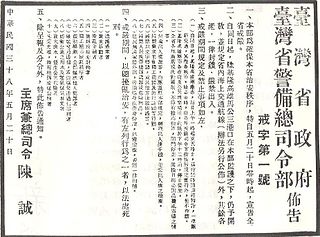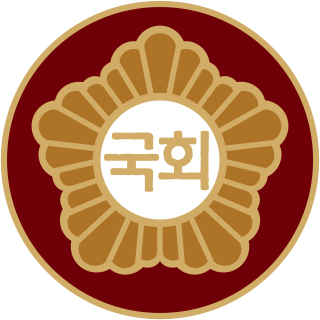
The government of Italy is in the form of a democratic republic, and was established by a constitution in 1948. It consists of legislative, executive, and judicial subdivisions, as well as a Head of State, or President.

A veto is a legal power to unilaterally stop an official action. In the most typical case, a president or monarch vetoes a bill to stop it from becoming law. In many countries, veto powers are established in the country's constitution. Veto powers are also found at other levels of government, such as in state, provincial or local government, and in international bodies.

The Constitution of the People's Republic of China is the supreme law of the People's Republic of China. It was adopted by the 5th National People's Congress on December 4, 1982, with further revisions about every five years. It is the fourth constitution in PRC history, superseding the 1954 constitution, the 1975 constitution, and the 1978 constitution. The constitution states that the People's Republic of China is communist and in essence a dictatorship of the proletariat.

The Constitution of the Republic of China is the fifth and current constitution of the Republic of China (ROC), ratified by the Kuomintang during the Constituent National Assembly session on 25 December 1946, in Nanjing, and adopted on 25 December 1947. The constitution, along with its Additional Articles, remains effective in ROC-controlled territories.
Hong Kong Basic Law Article 23 is an article in the Basic Law, the constitution of Hong Kong. It states that Hong Kong "shall enact laws on its own to prohibit any act of treason, secession, sedition, subversion against the Central People's Government, or theft of state secrets, to prohibit foreign political organizations or bodies from conducting political activities in the Region, and to prohibit political organizations or bodies of the Region from establishing ties with foreign political organizations or bodies."
A constitutional amendment is a modification of the constitution of a polity, organization or other type of entity. Amendments are often interwoven into the relevant sections of an existing constitution, directly altering the text. Conversely, they can be appended to the constitution as supplemental additions, thus changing the frame of government without altering the existing text of the document.

The Judicial Yuan is the judicial branch of the government of Taiwan. It runs a Constitutional Court and oversees all systems of courts of Taiwan, including ordinary courts like the supreme court, high courts, district courts as well as special courts like administrative courts and disciplinary courts. By Taiwanese law, the Judicial Yuan holds the following powers:

A regulation is a legal act of the European Union which becomes immediately enforceable as law in all member states simultaneously. Regulations can be distinguished from directives which, at least in principle, need to be transposed into national law. Regulations can be adopted by means of a variety of legislative procedures depending on their subject matter.
The Law of the People's Republic of China, officially referred to as the socialist legal system with Chinese characteristics, is the legal regime of China, with the separate legal traditions and systems of mainland China, Hong Kong, and Macau.

In most legal jurisdictions, a supreme court, also known as a court of last resort, apex court, and highcourt of appeal, is the highest court within the hierarchy of courts. Broadly speaking, the decisions of a supreme court are not subject to further review by any other court. Supreme courts typically function primarily as appellate courts, hearing appeals from decisions of lower trial courts, or from intermediate-level appellate courts.
Administrative law in China was virtually non-existent before the economic reform era. Since the 1980s, China has constructed a new legal framework for administrative law, establishing control mechanisms for overseeing the bureaucracy and disciplinary committees for the Chinese Communist Party. However, many have argued that the usefulness of these laws is vastly inferior in terms of controlling government actions, largely because of institutional and systemic obstacles like a weak judiciary, poorly-trained judges and lawyers, and corruption.

In re Article 26 and the Regulation of Information Bill 1995 [1995] 1 IR 1 was a decision of the Supreme Court of Ireland after a referral by President Mary Robinson under Article 26 of the Constitution of Ireland. This is a procedure whereby the constitutionality of a bill is considered by the Supreme Court before it is signed into law, similar to the concept of a facial challenge in the United States. If the Court finds that it is constitutional, it may not later be challenged after its enactment.
The Constitutional history of the People's Republic of China describes the evolution of its Constitutional system. The first Constitution of the People's Republic of China was promulgated in 1954. After two intervening versions enacted in 1975 and 1978, the current Constitution was promulgated in 1982. There were significant differences between each of these versions, and the 1982 Constitution has subsequently been amended several times. In addition, changing Constitutional conventions have led to significant changes in the structure of the Chinese government in the absence of changes in the text of the Constitution.

Martial law in Taiwan refers to the periods in the history of Taiwan after World War II, during control by the Republic of China Armed Forces of the Kuomintang-led regime. The term is specifically used to refer to the over 38-year-long consecutive martial law period between 20 May 1949 and 14 July 1987, which was qualified as "the longest imposition of martial law by a regime anywhere in the world" at that time.
Chinese property law has existed in various forms for centuries. After the Chinese Communist Revolution in 1949, most land is owned by collectivities or by the state; the Property Law of the People's Republic of China passed in 2007 codified property rights.

The Youth Protection Revision Act, commonly known as the Shutdown Law or Cinderella Law, was an act of the South Korean National Assembly which forbade children under the age of sixteen to play online video games between the hours of 00:00 and 06:00. The legislature passed the law on 19 May 2011 and it went into effect on 20 November 2011. The law was abolished in August 2021.
The Additional Articles of the Constitution of the Republic of China are the revisions and constitutional amendments to the original constitution to meet the requisites of the nation and the political status of Taiwan "prior to national unification". The Additional Articles are usually attached after the original constitution as a separate document. It also has its own preamble and article ordering different from the original constitution.

The Act Governing Relations between the People of the Taiwan Area and the Mainland Area, also called Cross-Strait Act, is the law of the Republic of China governing cross-Strait relations.

The Constitution of the People's Republic of Bangladesh was adopted by the Constituent Assembly on 4 November 1972 and became effective on 16 December 1972 one year after Bangladesh's victory in the War of Liberation. As of 2018 the Constitution has been amended 17 times. The procedure for amendments is demarcated in Article 142, a bill must be presented in the Jatiya Sangsad with the support of no less than two-thirds of all its members . Amending the Constitution of Bangladesh is the process of making changes to the nation's supreme law.

The constitutional oath of office of China was implemented on January 1, 2016, through a decision by the Standing Committee of the National People's Congress of China. The oath of office requirement applies to state civil servants elected or appointed by the National People's Congress and its Standing Committee at or above the county level.













